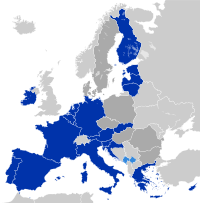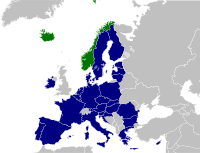Budget accountability in the European Union: Difference between revisions
m →Books on the subject: Remove blank line(s) between list items per WP:LISTGAP to fix an accessibility issue for users of screen readers. Do WP:GENFIXES and cleanup if needed. Discuss this at [[Wikipedia talk:WikiProject Accessibility#LIS... |
Rescuing 2 sources and tagging 0 as dead. #IABot (v1.2.4) |
||
| Line 11: | Line 11: | ||
At present, the meetings of the [[Council of the European Union|Council of Ministers]] (the relevant Minister from each member state) are mostly public, a webcast on the sessions can be seen on the website of the Council.<ref>[http://video.consilium.europa.eu video.consilium.europa.eu – Council LIVE]</ref> What goes on behind the scenes will, of course, never be televised. |
At present, the meetings of the [[Council of the European Union|Council of Ministers]] (the relevant Minister from each member state) are mostly public, a webcast on the sessions can be seen on the website of the Council.<ref>[http://video.consilium.europa.eu video.consilium.europa.eu – Council LIVE]</ref> What goes on behind the scenes will, of course, never be televised. |
||
Also, the standard of plenary sittings of the [[European Parliament]] is to [[Streaming media|stream]] the debates over the Internet.<ref>[http://www.europarltv.europa.eu/ europarl'''tv'''] and [http://www.europarl.europa.eu/eng-internet-publisher/eplive/public/default.do?language=en EP Live]</ref> In addition, the public can observe sittings directly from a separate gallery. Also, nearly all sittings of [[European Parliament#Organisation|Parliamentary Committees]] are observable by the public,<ref>[http://www.europarl.europa.eu/eng-internet-publisher/eplive/public/default.do?language=en EP Live]</ref> except for certain matters such as requests for removal of the parliamentary immunity of a Member of the European Parliament. |
Also, the standard of plenary sittings of the [[European Parliament]] is to [[Streaming media|stream]] the debates over the Internet.<ref>[http://www.europarltv.europa.eu/ europarl'''tv'''] and [http://www.europarl.europa.eu/eng-internet-publisher/eplive/public/default.do?language=en EP Live] {{wayback|url=http://www.europarl.europa.eu/eng-internet-publisher/eplive/public/default.do?language=en |date=20101002111233 |df=y }}</ref> In addition, the public can observe sittings directly from a separate gallery. Also, nearly all sittings of [[European Parliament#Organisation|Parliamentary Committees]] are observable by the public,<ref>[http://www.europarl.europa.eu/eng-internet-publisher/eplive/public/default.do?language=en EP Live] {{wayback|url=http://www.europarl.europa.eu/eng-internet-publisher/eplive/public/default.do?language=en |date=20101002111233 |df=y }}</ref> except for certain matters such as requests for removal of the parliamentary immunity of a Member of the European Parliament. |
||
In addition, the activities of the [[European Commission]] are subject to [[Transparency (humanities)|transparency]]. The monitoring of the Commission has to be performed by a body that is independent of the Commission, such as "European Anti-Fraud Office" (OLAF) that reports to the European Parliament.<ref>[http://ec.europa.eu/anti_fraud/ OLAF website]</ref> |
In addition, the activities of the [[European Commission]] are subject to [[Transparency (humanities)|transparency]]. The monitoring of the Commission has to be performed by a body that is independent of the Commission, such as "European Anti-Fraud Office" (OLAF) that reports to the European Parliament.<ref>[http://ec.europa.eu/anti_fraud/ OLAF website]</ref> |
||
Revision as of 07:54, 3 October 2016
| This article is part of a series on |
 |
|---|
|
|
As with all public budgets, the EU's budget is also at risk of maladministration. Every year, the Court of Auditors reports on the management of the budget. The introduction of transparency and a double-entry book-keeping system is likely to improve budget management.[1]
In order to strengthen the means of fraud prevention, the Commission established the European Anti-Fraud Office (OLAF - Office Européen de Lutte Anti-Fraude) by EC, ECSC Decision 1999/352.[2] The Office was given responsibility for conducting administrative anti-fraud investigations by having conferred on it a special independent status.
Auditing
The Court of Auditors checks that all the Union's revenue has been received and all its expenditure incurred in a lawful and regular manner and that the EU budget has been managed soundly. The Court was established on 22 July 1975 by the Budgetary Treaty of 1975. The Court started operating as an external Community audit body in October 1977.
Transparency
At present, the meetings of the Council of Ministers (the relevant Minister from each member state) are mostly public, a webcast on the sessions can be seen on the website of the Council.[3] What goes on behind the scenes will, of course, never be televised.
Also, the standard of plenary sittings of the European Parliament is to stream the debates over the Internet.[4] In addition, the public can observe sittings directly from a separate gallery. Also, nearly all sittings of Parliamentary Committees are observable by the public,[5] except for certain matters such as requests for removal of the parliamentary immunity of a Member of the European Parliament.
In addition, the activities of the European Commission are subject to transparency. The monitoring of the Commission has to be performed by a body that is independent of the Commission, such as "European Anti-Fraud Office" (OLAF) that reports to the European Parliament.[6]
See also
- Resignation of the Santer Commission
- Marta Andreasen - former Chief Accountant of the European Union. She criticises the European Union accounting system for being open to fraud.
- Paul van Buitenen - former auditor in the European Union who denounced fraud and mismanagement within the commission and the abuse of the EU expenses and staff allowance system.
- List of books on the European Union
References
- ^ Auditor blames politicians for EC waste and corruption (The Sunday Herald, 8 August 2004)
- ^ 1999/352/EC, ECSC, Euratom: Commission Decision of 28 April 1999 establishing the European Anti-fraud Office (OLAF)
- ^ video.consilium.europa.eu – Council LIVE
- ^ europarltv and EP Live Template:Wayback
- ^ EP Live Template:Wayback
- ^ OLAF website
Books on the subject
- Andreas Oldag, Hans-Martin Tillack: Raumschiff Brüssel – Wie die Demokratie in Europa scheitert (in German, Spaceship Brussels – How Democracy in Europe fails), Argon Verlag, 2003 (1st ed., hardcover), ISBN 3-87024-578-6, ISBN 978-3-87024-578-8 / Fischer, Frankfurt 2004 (2nd ed.) ISBN 3-596-15746-3, ISBN 978-3-596-15746-4
- Paul van Buitenen: Blowing the Whistle: Fraud in the European Commission, Politicos Pub, 2000, ISBN 1-902301-46-3, ISBN 978-1-902301-46-4
External links




